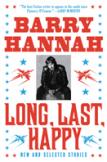Devil-Ridden Dixie
Barry Hannah’s posthumous anthology comes garlanded with praise most fiction writers would not dare to imagine: tributes gathered throughout his fertile, tormented (by alcohol and other demons) career, from the likes of William Styron (“an original”), Philip Roth (“fierce and pitiless southern comedy”), Thomas McGuane (“a voice so original and enduring”), Cynthia Ozick (“explosive”), Richard Ford (“incomparably fresh”) and John Grisham (“just fearless”). Newcomers to Hannah (d. 2010) are bound to be astonished by the dazzling quickness and quirkiness of his language, his insatiable appetite for passion, pain and pessimism, his vast technical knowledge on subjects like hunting and fishing, military aircraft, music and firearms of every description. But readers, unless they are fellow professionals studying his craft, may well find his endlessly haunted characters a bit much.
Born, raised and mostly educated in Mississippi, Hannah presents us in these 31 stories with a desperate collection of philosophical southern losers inhabiting a landscape blighted by violence (notably arson), memories of war (Civil, Korean, Vietnam, Gulf), racism (Hannah’s blacks are seen and hated but not heard), drunkenness, moribund old-time religion, dysfunctional marriages and families, talents squandered and guilt over all of the above.
In “Rat-Faced Auntie” Edgar, a gifted, hugely successful young jazz trombonist, surrenders to booze, loses his gorgeous wife, stops playing, then heads to grad school with plans to write a thesis on “bums in Chicago” with the help of steady welfare checks from his odious, impossible Aunt Hadley. He finds another loving woman, Emma, who in a rage over his fecklessness hurls a bowl of Lysol in his face, almost blinding him—but right afterward promises to stay with and care for him till death. As the story ends, Edgar discovers a twisted sort of vocation: his aged aunt will pay him to turn her voluminous diaries into a book, which he plans to call Rat-Face Confesses. Meanwhile, he tells Emma, “I release you body and soul.… Have at the kings and princes.”
In “Hey, Have You Got a Cig, the Time, the News, My Face?” a prosperous, seemingly in-control hack writer named E. Dan Ross watches and worries over his self-destructive son Newt, a poet and creative writing teacher—Hannah spent 28 years on that job at the University of Mississippi—who lurches drunkenly from job to job and wife to wife (Hannah had three). Newt crashes and does time in a mental hospital, runs away to be a Mormon preacher and winds up, temporarily sane, a quasi-evangelical, in charge of a brutal reform school. His “normal” father, it turns out, can’t recover from the trauma of having sent a dozen Marine buddies to their death in Vietnam by directing them to land on the wrong beach and now likes to blow off steam by driving around and peppering random people with the air rifle he keeps in a specially designed compartment.
Much of this doomed world recalls the sodden male misery that Raymond Carver was so adept at ushering us into. But whereas Carter’s men were typically clueless, muttering types, Hannah’s men (and narrators) span a whole spectrum of eloquence. One deftly sketches a situation:
A man back in the twenties came to town and started a poker game. Men gathered and drank. Peter lost his money and started a fight. The man took a chair and repeatedly ground it into his face while Peter was on the floor. Peter went out into the town, found a pistol, came back and shot the man. The brothers went about influencing the jury, noting that the victim was trash, an out-of-towner. The judge agreed. The victim was sentenced to remain dead. Peter was let go.
Typically, however, Hannah goes for more lyrical riffs, like this:
He slipped over easily into the brogue of love, that long hill-country moan that required slow action around the tongue and almost no lip opening to a song against coherence. Without her around he despised it, listening to men gossip at the barber’s, the cafés in Holly Springs and Oxford. General Grant was headquartered in Holly Springs, where the antebellum mansions still stood, although in a flat of lackness, frozen in brine, much like those in Natchez, a back-lot set for zombies in a costume feed.
Whew. Spending half a lifetime literally in the shadow of William Faulkner has its costs.
Say what you like, Hannah was a natural, a torrent of shrewd observations and apothegms: “Life was a long wonderful thing. It was so good you expected some official to show up and cancel it.” This, in fact, is the conviction that prevents Hannah’s people—most of them, anyhow, and not least of all his authorial persona—from solving their problems with suicide or silence. But, riveting as the author’s voice can be, the reader remains stuck inside the mind of the speaker, who is almost always a witty, educated white male with a drinking problem and a sorry past. Women appear mainly as impermanent appendages of men; children are few and far between. Adults don’t develop, they devolve.
Well, such gloom can be real enough; but is that all there is? Deputy James, a man hell-bent on revenging the murder of his photo-journalist father during the bitter desegregation of the University of Mississippi in 1962, wonders whether “he himself might be just one of another confused but adamant sect.” Exactly. Hannah’s “sectarians,” for all their wretchedness, are an unforgettable lot. But couldn’t they, some of them at least, just go into rehab and get a life?
This article also appeared in print, under the headline “Devil-Ridden Dixie,” in the March 28, 2011, issue.








